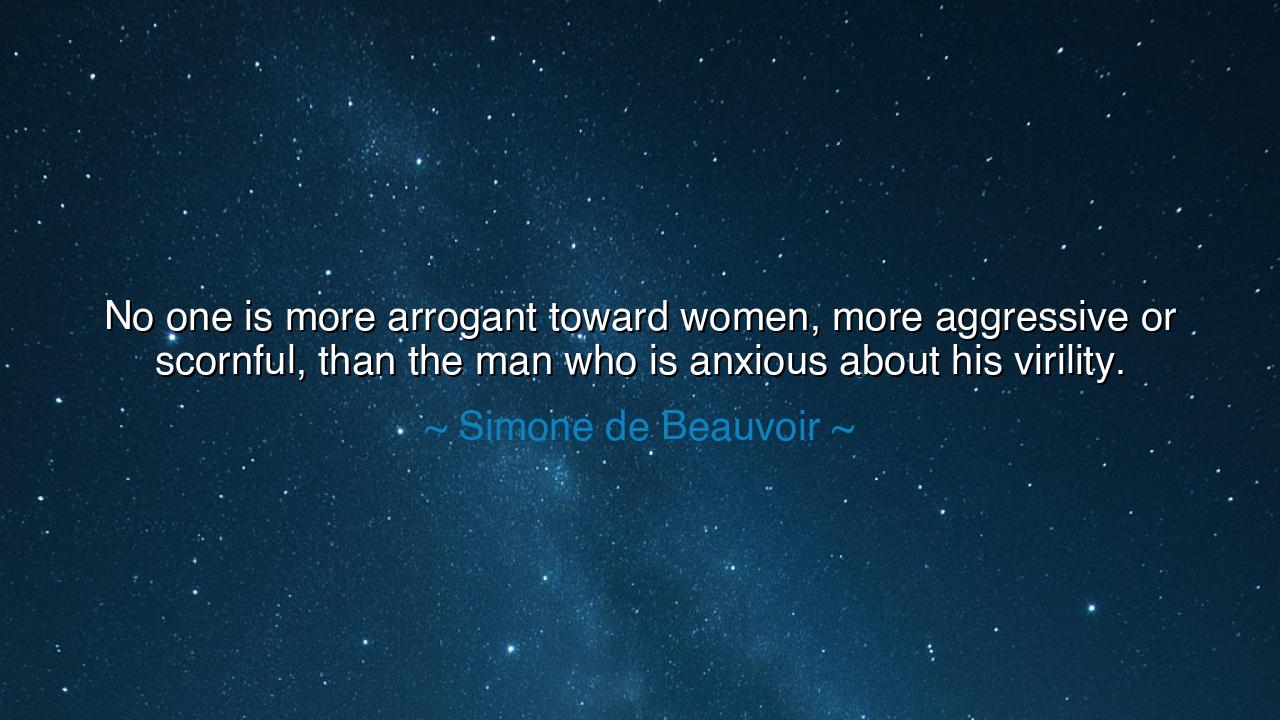
No one is more arrogant toward women, more aggressive or
No one is more arrogant toward women, more aggressive or scornful, than the man who is anxious about his virility.






The words of Simone de Beauvoir, “No one is more arrogant toward women, more aggressive or scornful, than the man who is anxious about his virility,” pierce like a blade through the veil of pride. Here she reveals a paradox of power: that the cruelty of men toward women often springs not from strength, but from fear. The man uncertain of his own manhood cloaks his insecurity with arrogance, hides his trembling with aggression, and masks his doubt with scorn. His violence is not proof of mastery, but a confession of weakness.
De Beauvoir, the philosopher of freedom and author of The Second Sex, spoke from deep reflection on the structures of patriarchy. She saw that the oppression of women was not only a system of laws and traditions, but also the trembling of fragile egos. To question a man’s virility was to shake the foundation of his identity, and in panic he would lash out at those who reminded him of this fragility. Thus, arrogance became his armor, aggression his shield, scorn his false crown.
History offers many illustrations. Consider the rule of Henry VIII of England, whose desperate need for a male heir drove him to discard, humiliate, and even execute the women he married. His obsession with proving his virility to the world was matched only by the brutality with which he treated his






QGQuy Giang
De Beauvoir’s quote offers an insightful look into how men who are insecure about their virility often turn that frustration into aggression toward women. It’s troubling to think how widespread this mentality still is. How can we begin to shift societal attitudes toward masculinity, so that men are no longer pressured to prove their worth through dominance? What changes can we make in the way we raise boys to help prevent this cycle of insecurity and aggression?
AAn
Simone de Beauvoir’s observation about the connection between insecurity and aggression toward women is a stark commentary on toxic masculinity. It suggests that some men’s fragile egos lead to disrespecting women. But how much of this is rooted in cultural conditioning rather than individual behavior? Is there a way to shift the mindset of men who equate strength or virility with superiority? Can we unlearn these harmful traits and foster healthier relationships between genders?
AHNguyen Anh Hao
De Beauvoir’s quote reveals a sad truth about how some men’s insecurities lead to hostility toward women. It’s fascinating that the need to prove virility can manifest in such arrogance and aggression. How much of this behavior is driven by cultural pressure? Should we work on changing the narrative around masculinity, so men feel secure without having to assert dominance or degrade others, particularly women, in the process?
TQBui The Quyen
Simone de Beauvoir’s quote about men’s aggression toward women due to insecurity about their virility really makes me think about the toxic relationship between masculinity and power. It’s interesting how some men may feel the need to belittle women to compensate for their own insecurities. How does this type of behavior perpetuate gender inequality? Can we ever break the cycle where men’s value is tied to their virility, or is it ingrained in societal expectations?